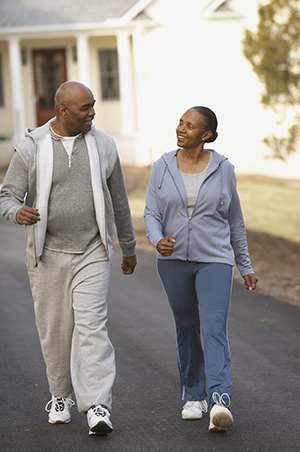Exercise and Older Adults
Exercise is good for people of all ages

There are many benefits of a regular exercise program. This is true even for people who have joint pain, back pain, arthritis, or osteoporosis. And it’s true for people who are recovering from an injury or from surgery such as joint replacement or arthroscopy. Exercise has also been shown to help people of all ages by lowering blood pressure. It also lowers the risk of falls and serious injuries (such as hip or wrist fractures). Exercise can slow the body’s loss of muscle and bone mass. Exercise also helps to do the following:
-
Increase flexibility
-
Tone muscles
-
Build stronger bones
-
Improve mobility and balance
-
Boost self-image
-
Relieve insomnia
-
Ease tension and stress
-
Offset feelings of anxiety and depression
-
Improve thinking ability
-
Improve balance
-
Stay at a healthy weight
-
Enhance cardiovascular fitness
-
Increase HDL (good) cholesterol levels
-
Reduce the risk of chronic diseases (such as type 2 diabetes and certain types of cancer, such as breast cancer and colon cancer)
-
Provide fun and enjoyment
-
Live a longer, healthier life
-
Reduce joint and muscle pain
Exercise guidelines for older adults
It’s never too late to start an exercise program. With today’s medical technology and scientific advances, more people are living longer. And with longer lives, people are looking for a higher quality of life. Greater importance is placed on independent, healthy living. Exercise is a great way to keep older people active.
The CDC lists the following physical activity guidelines for older adults:
-
Move more and sit less. Some activity during the day is better than none.
-
For the most benefit, do at least 150 minutes (2 hours and 30 minutes) of medium-intensity exercise a week.
-
Gain more benefits by doing 300 minutes of medium-intensity physical activity a week.
-
Experts advise doing muscle-strengthening activities that involve all major muscle groups on 2 or more days a week for more health benefits.
-
Balance training is advised as part of weekly physical activity to prevent falls.
Approach exercise carefully. It doesn’t have to be vigorous to be helpful. Even a walk around the park can be positive for any age body and mind. So can 30 minutes of working in the garden. You also don’t have to do 30 minutes of exercise all at one time. Research now suggests it’s just as helpful to do 3, 10-minute periods of exercise spread out over the day.
Talk with your healthcare provider if you have an existing health condition, have had a recent surgery, or you are just starting an exercise program. Your provider can help make sure the exercise program that you choose is designed with your health and wellness in mind.